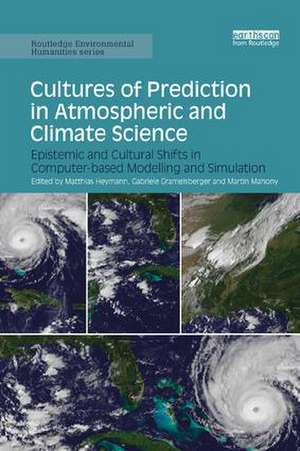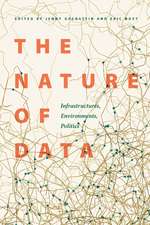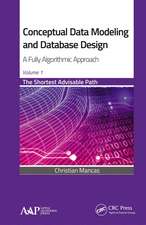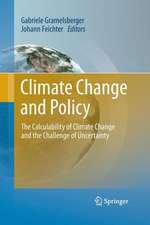Cultures of Prediction in Atmospheric and Climate Science: Epistemic and Cultural Shifts in Computer-based Modelling and Simulation: Routledge Environmental Humanities
Editat de Matthias Heymann, Gabriele Gramelsberger, Martin Mahonyen Limba Engleză Paperback – 17 ian 2019
Through a diverse range of case studies, spanning over a century of theoretical and practical developments in the atmospheric and environmental sciences, this book argues that computer modelling and simulation have substantially changed scientific and cultural practices and shaped the emergence of novel ‘cultures of prediction’.
Making an innovative, interdisciplinary contribution to understanding the impact of computer modelling on research practice, institutional configurations and broader cultures, this volume will be essential reading for anyone interested in the past, present and future of climate change and the environmental sciences.
| Toate formatele și edițiile | Preț | Express |
|---|---|---|
| Paperback (1) | 356.45 lei 6-8 săpt. | |
| Taylor & Francis – 17 ian 2019 | 356.45 lei 6-8 săpt. | |
| Hardback (1) | 1046.91 lei 6-8 săpt. | |
| Taylor & Francis – 25 apr 2017 | 1046.91 lei 6-8 săpt. |
Din seria Routledge Environmental Humanities
-
 Preț: 295.40 lei
Preț: 295.40 lei -
 Preț: 289.51 lei
Preț: 289.51 lei -
 Preț: 302.45 lei
Preț: 302.45 lei -
 Preț: 303.87 lei
Preț: 303.87 lei -
 Preț: 294.99 lei
Preț: 294.99 lei -
 Preț: 288.41 lei
Preț: 288.41 lei -
 Preț: 386.31 lei
Preț: 386.31 lei -
 Preț: 340.64 lei
Preț: 340.64 lei -
 Preț: 281.14 lei
Preț: 281.14 lei -
 Preț: 310.51 lei
Preț: 310.51 lei -
 Preț: 280.72 lei
Preț: 280.72 lei -
 Preț: 369.99 lei
Preț: 369.99 lei -
 Preț: 288.72 lei
Preț: 288.72 lei -
 Preț: 303.87 lei
Preț: 303.87 lei -
 Preț: 326.78 lei
Preț: 326.78 lei -
 Preț: 311.41 lei
Preț: 311.41 lei -
 Preț: 288.37 lei
Preț: 288.37 lei -
 Preț: 191.93 lei
Preț: 191.93 lei -
 Preț: 347.73 lei
Preț: 347.73 lei - 18%
 Preț: 1050.78 lei
Preț: 1050.78 lei - 20%
 Preț: 1046.91 lei
Preț: 1046.91 lei - 28%
 Preț: 821.14 lei
Preț: 821.14 lei -
 Preț: 446.53 lei
Preț: 446.53 lei - 18%
 Preț: 1001.84 lei
Preț: 1001.84 lei -
 Preț: 441.74 lei
Preț: 441.74 lei - 26%
 Preț: 850.17 lei
Preț: 850.17 lei - 18%
 Preț: 1001.84 lei
Preț: 1001.84 lei -
 Preț: 369.95 lei
Preț: 369.95 lei -
 Preț: 415.24 lei
Preț: 415.24 lei - 18%
 Preț: 1001.07 lei
Preț: 1001.07 lei - 18%
 Preț: 1054.71 lei
Preț: 1054.71 lei - 18%
 Preț: 1000.87 lei
Preț: 1000.87 lei - 26%
 Preț: 819.09 lei
Preț: 819.09 lei - 18%
 Preț: 1171.19 lei
Preț: 1171.19 lei - 18%
 Preț: 1000.27 lei
Preț: 1000.27 lei - 16%
 Preț: 277.74 lei
Preț: 277.74 lei - 18%
 Preț: 1000.27 lei
Preț: 1000.27 lei -
 Preț: 403.91 lei
Preț: 403.91 lei - 15%
 Preț: 297.57 lei
Preț: 297.57 lei - 18%
 Preț: 1002.63 lei
Preț: 1002.63 lei - 18%
 Preț: 1053.16 lei
Preț: 1053.16 lei - 13%
 Preț: 297.99 lei
Preț: 297.99 lei - 18%
 Preț: 1004.20 lei
Preț: 1004.20 lei
Preț: 356.45 lei
Preț vechi: 445.57 lei
-20% Nou
Puncte Express: 535
Preț estimativ în valută:
68.20€ • 71.21$ • 56.45£
68.20€ • 71.21$ • 56.45£
Carte tipărită la comandă
Livrare economică 05-19 aprilie
Preluare comenzi: 021 569.72.76
Specificații
ISBN-13: 9780367152291
ISBN-10: 0367152290
Pagini: 256
Ilustrații: 14 Line drawings, black and white; 3 Halftones, black and white; 1 Tables, black and white
Dimensiuni: 156 x 234 x 15 mm
Greutate: 0.45 kg
Ediția:1
Editura: Taylor & Francis
Colecția Routledge
Seria Routledge Environmental Humanities
Locul publicării:Oxford, United Kingdom
ISBN-10: 0367152290
Pagini: 256
Ilustrații: 14 Line drawings, black and white; 3 Halftones, black and white; 1 Tables, black and white
Dimensiuni: 156 x 234 x 15 mm
Greutate: 0.45 kg
Ediția:1
Editura: Taylor & Francis
Colecția Routledge
Seria Routledge Environmental Humanities
Locul publicării:Oxford, United Kingdom
Public țintă
PostgraduateCuprins
1. Introduction 2. Key Characteristics of Cultures Prediction Matthias Heymann, Gabriele Gramelsberger, and Martin Mahony Part I: Junctions: Science and Politics of Prediction 3. Calculating the Weather: Emerging Cultures of Prediction in Late Nineteenth- and Early Twentieth-century Europe Gabriele Gramelsberger 4. Which Design for a Weather Predictor? Speculating on the Future of Electronic Forecasting in Post‐War America Christoph Rosol 5. A New Climate: Hubert H. Lamb and Boundary Work at the UK Meteorological Office Janet Martin‐Nielsen 6. From Heuristic to Predictive: Making Climate Models Political Instruments Matthias Heymann and Nils Hundebøl 7. How to Develop Climate Models? The "Gamble" of Improving Climate Model Parameterizations Hélène Guillemot Part II: Challenges and Debates: Negotiating and Using Simulation Knowledge 8. The (Re)emergence of Regional Climate: Mobile Models, Regional Visions and the Government of Climate Change Martin Mahony 9. Bellwether, Exceptionalism, and Other Tropes: Political Coproduction of Artic Climate Modeling Sverker Sörlin, Ralf Döscher, Annika E. Nilsson and Nina Wormbs 10. From Predictive to Instructive: Using Models for Geoengineering Johann Feichter and Markus Quante 11. Validating Models in the Face of Uncertainty: Geotechnical Modeling and Dike Vulnerability in the Netherlands Matthijs Kouw 12. Tracing Uncertainty Management Through Four IPCC Assessment Reports and Beyond Catharina Landström 13. The Future Face of the Earth: The Visual Semantics of the Future in the Climate Change Imagery of hte IPCC Birgit Schneider
Recenzii
"Predicting the (climatic) future is never an innocent or neutral act. Climate predictions emerge from particular value-laden cultures; hence these predicted futures exert a powerful control over the present. For this reason, the ‘black-box’ of climate prediction needs critical scrutiny from the social and humanistic sciences, a task brilliantly executed in this new collection of essays." - Mike Hulme, professor of climate and culture, King’s College London
"This is a truly outstanding survey of the cultures of prediction in the field of atmospheric and climate science. Through case studies and illustrative examples drawn from a wide range of countries and disciplines, the authors skillfully trace both epistemic and cultural shifts in modelling and simulation techniques." - Helmuth Trischler, Head of Research of the Deutsches Museum, Munich, and Director of the Rachel Carson Center for Environment and Society, University of Munich
"Prediction is everywhere in our societies but we usually do not interrogate how we actually do predictions, including in environmental sciences. Cultures of Prediction is thus essential reading – and a fascinating set of case studies. But more, it illuminates beautifully the culture and politics of expertise in global environmental change." - Mark Carey, Associate Professor of History and Environmental Studies, Clark Honors College, University of Oregon
"Cultures of Prediction brings together a wonderfully rich kaleidoscope of empirical perspectives to create a new vision for the social study of atmospheric and climate science. The unifying focus on computer modelling and simulation represents a substantial and very timely intellectual achievement. It is an indispensable resource for academics and practitioners alike." - Phaedra Daipha, Rutgers University, author of Masters of Uncertainty: Weather Forecasters and the Quest for Ground Truth
"Because it addresses weather and climate models from multiple perspectives, scholars from science and social science disciplines will find this book of interest as it touches on the intersection of science and politics in model development, knowledge development, and applications." - Kristine C. Harper, Associate Professor of History, Department of History, Florida State University, Tallahassee
"This is a truly outstanding survey of the cultures of prediction in the field of atmospheric and climate science. Through case studies and illustrative examples drawn from a wide range of countries and disciplines, the authors skillfully trace both epistemic and cultural shifts in modelling and simulation techniques." - Helmuth Trischler, Head of Research of the Deutsches Museum, Munich, and Director of the Rachel Carson Center for Environment and Society, University of Munich
"Prediction is everywhere in our societies but we usually do not interrogate how we actually do predictions, including in environmental sciences. Cultures of Prediction is thus essential reading – and a fascinating set of case studies. But more, it illuminates beautifully the culture and politics of expertise in global environmental change." - Mark Carey, Associate Professor of History and Environmental Studies, Clark Honors College, University of Oregon
"Cultures of Prediction brings together a wonderfully rich kaleidoscope of empirical perspectives to create a new vision for the social study of atmospheric and climate science. The unifying focus on computer modelling and simulation represents a substantial and very timely intellectual achievement. It is an indispensable resource for academics and practitioners alike." - Phaedra Daipha, Rutgers University, author of Masters of Uncertainty: Weather Forecasters and the Quest for Ground Truth
"Because it addresses weather and climate models from multiple perspectives, scholars from science and social science disciplines will find this book of interest as it touches on the intersection of science and politics in model development, knowledge development, and applications." - Kristine C. Harper, Associate Professor of History, Department of History, Florida State University, Tallahassee
Descriere
In recent decades science has experienced a revolutionary shift. The development and extensive application of computer modelling and simulation has transformed the knowledge‐making practices of scientific fields as diverse as astro‐physics, genetics, robotics and demography. This epistemic transformation has brought with it a simultaneous heightening of political relevance and a renewal of international policy agendas, raising crucial questions about the nature and application of simulation knowledges throughout public policy.
Through a diverse range of case studies spanning over a century of theoretical and practical developments in the atmospheric and environmental sciences, this book argues that computer modelling and simulation have substantially changed scientific and cultural practices and shaped the emergence of novel ‘cultures of prediction’.
Making an innovative, interdisciplinary contribution to understanding the impact of computer modelling on research practice, institutional configurations and broader cultures, this volume will be essential reading for anyone interested in the past, present, and future of climate change and the environmental sciences.
Through a diverse range of case studies spanning over a century of theoretical and practical developments in the atmospheric and environmental sciences, this book argues that computer modelling and simulation have substantially changed scientific and cultural practices and shaped the emergence of novel ‘cultures of prediction’.
Making an innovative, interdisciplinary contribution to understanding the impact of computer modelling on research practice, institutional configurations and broader cultures, this volume will be essential reading for anyone interested in the past, present, and future of climate change and the environmental sciences.












